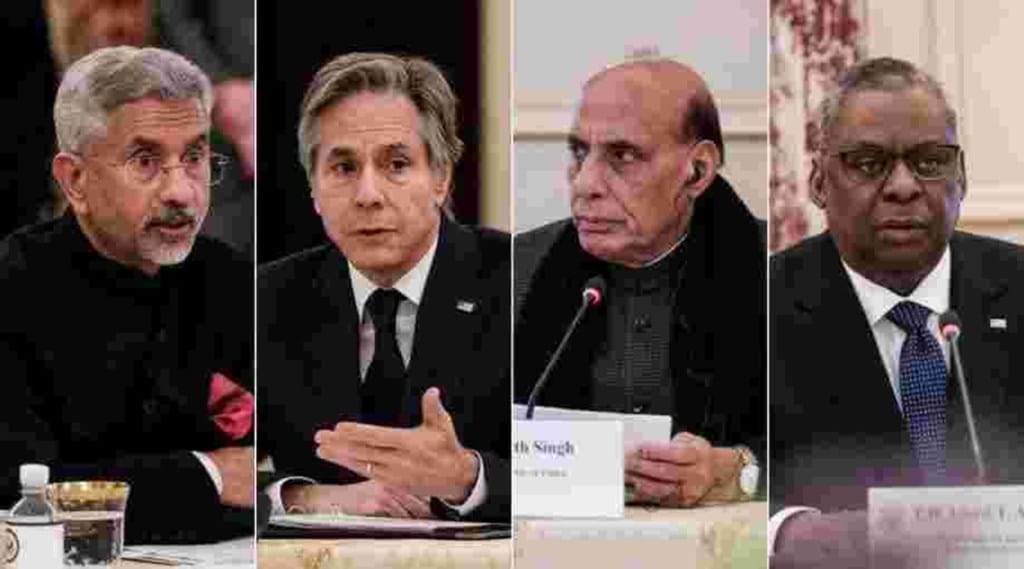India and the US had the 4th round of 2+@ Ministerial Dialogue, where the focus was not only on free and open Indo-Pacific Region, but on food and energy security too.
This was the first 2+2 dialogue under the Biden Administration, which was preceded by a virtual meeting between Prime Minister Narendra Modi and the US President Joe Biden.
US says “able and willing’’
Recalling Nehru-Truman, the US says, it is “able & willing’’ to take forward the relations with India.
The Biden administration believes, despite the differences between the two countries over the ongoing Russia-Ukraine crisis, “times have changed’.’
Both countries are now being considered as close strategic partners, and the bilateral relations between the two which is almost 75 years old is following in the footsteps of India’s first Prime Minister Jawahar Lal Nehru had envisioned.
At the 2+2 in Washington DC, Defence Minister Rajnath Singh, External Affairs Minister S Jaishankar, and US Secretary of State Antony J Blinken and Defence Secretary Lloyd Austin were present.
PM Modi and President Biden talked about the Russia-Ukraine crisis and Beijing and Moscow coming closer and its implications.
At the ministerial level talks, the US also raised the issue of Human Rights abuse in India.
Responding to a question at the joint press conference, the US Secretary of State said that the two countries are committed to democratic values, such as protecting human rights.
On India-Russia relations, according to Blinken, the reason why India’s relationship with Russia continued to deepen over the past decades, and not so much with the US, is because Washington was “not able to be a partner” of New Delhi. “Times have changed”, he said.
He also highlighted how India is a partner of choice – in various sectors like education, security, technology and commerce. The US side also noted India’s strong statements made both in the Indian Parliament and at the UN in New York condemning the killing of civilians in Ukraine and India calling for independent investigation.
The US also noted India providing humanitarian assistance to the people of Ukraine which included medicines too. “India has to make its own decisions about how it approaches this challenge. We as a general proposition are consulting with all of our allies and partners on the consequences of Putin’s war, the atrocities being committed against the people of Ukraine.”
Oil purchases from Russia
The US side also told India that it expects its allies and partners to cut down Russian energy purchases.
Alluding to the very fact that India is buying a miniscule amount of oil from Russia, compared to some European countries, Jaishankar said this is often needed for energy security purposes.
In his response, Dr Jaishankar also highlighted the fact that despite sanctions Europe itself is buying oil and gas from Russia. “Probably our total purchases for the month would be less than what Europe does in an afternoon,” the minister said.
Due to the ongoing crisis the biggest challenges and concerns countries around the world are facing include limited supplies, rising prices, energy security and increasing premiums.
According to Dr Jaishankar, soon there will be issues related to food security.
CAATSA waiver for India remains undecided
The US has not yet taken a decision on whether or not to give a waiver to India under CAATSA (Countering America’s Adversaries Through Sanctions Act), for the S-400 air defence missiles from Russia.
Said the US Secretary of State, “We have not yet made a determination regarding potential sanctions or potential waivers under the CAATSA law.” Adding that the US is working towards becoming India’s security partner and to replace Russia.
India has more options to buy arms
India has multiple suppliers when it comes to buying arms and equipment, said Dr Jaishankar.
According to Secretary Defence, both countries are becoming strong and reliable partners for each other, making sure the systems are affordable and there is interoperability.
Defence Minister Rajnath Singh pushed for co-production of arms and other military platforms under the “Make in India’’ initiative and to have more indigenous content on the platforms.
On the growing Russia-China closeness, according to Austin, “China is seeking to refashion the region and the international system more broadly in ways that serve its interests.”
At the end of the ministerial, in the defence sector both countries have identified new ways of deepening cooperation and operational reach of the two militaries and to work closely across the expanse of the Indo-Pacific.
The joint statement issued at the end of the dialogue stated that the two countries to meet the challenges to the rule-based order, including South China Sea, reiterated the importance of adherence to international law.
India and the US talked about the expansion of their ties in new defence areas like cyberspace and space, to meet the emerging challenges of the century.
While the US reaffirmed continued support for India’s permanent membership in a reformed UNSC and for India’s entry to the Nuclear Suppliers’ Group, India has reiterated its commitment to work together in close coordination at the UNSC and in international organizations.
In pursuance of their shared vision for a free, open and inclusive Indo-Pacific, both sides reviewed the progress made on the agenda of the QUAD since last year to deliver peace and prosperity to the region. And agreed to take forward the initiatives announced at the Leaders Summit in DC.
Issues related to Afghanistan, Middle East and the Indian subcontinent were also discussed.

